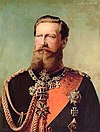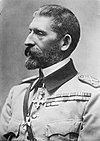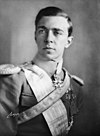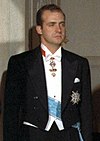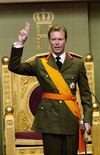Monarchy of Mespalia
| King of Mespalia | |
|---|---|
 | |
| Incumbent | |
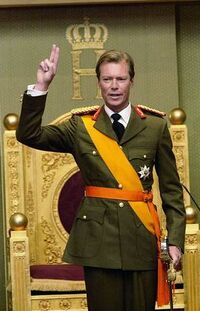 | |
| Francis V since 27 May 2010 | |
| Details | |
| Style | His Majesty |
| First monarch | Francis I |
| Formation | 20 September 1808 |
| Residence | Royal Palace of Iouzzene |
The King of Mespalia is, according to the Constitution of Mespalia the monarch and the head of state of the Kingdom of Mespalia. Unlike most monarchies which are hereditary, Mespalia is an electoral monarchy. Upon the abdication or death of the previous king, the National Assembly, a temporary body that consists of elected representatives, delegates of various interest groups and nobles, elects a new King. Seven out of twelve Mespalian kings, including the current king, come from the Râcava dynasty.
Election
The King of Mespalia is elected using a complex system of electoral college known as the National Assembly. The National Assembly consists of nobles, representatives elected directly by the population and delegates of various interest groups. The National Assembly is automatically called when the previous King dies or abdicates and is then tasked with choosing the next King.
After the Assembly elects a president and three vice presidents to chair the Assembly, members then begin voting for the next king under a secret single transferable vote system. The process of accepting all the nominations usually takes several days. After all nominations have been filed and accepted, they are voted on. The candidate must recieve an absolute majority of the votes to be elected King. If no candidate gets a majority, new rounds are held every day until one candidate reaches the majority. If after several rounds no one candidate gets a majority, the president may begin disqualifying those candidates with very few votes, potentially until only two candidates are left. After a candidate is elected with an absolute majority, they become the king-elect and their coronation must be held within one month of the election.
Powers
The Constitution of Mespalia vests the King with broad executive, legislative and judicial powers and also names him the only executive power in the country. As such, the King usually takes part in day-to-day running of the state. These powers include the appointment of judges, appointment and dismissal of members of the Council of State or the entire government, veto power on legislation, issuing of royal decrees and the right to call for a national assembly.
The Monarch exercises his executive power either alone, or by chairing meetings of the Council of State. Alternatively, he can let the Minister of State chair the meetings. Whether the King chairs the meeting or not, his presence in the Council is referred to as King in Council (Mespalian: Râ etâtticonceilessa, French: Roi en Conseil d'Estat and is required for the Council to excercise executive power. When the Monarch is unable to attend the meetings, he can be represented by the Regent, usually the heir apparent or other member of the royal family, which in turn is referred to as Regent on Behalf of the King in Council (Mespalian: Rechentte rân pôlesta etâtticonceilessa, French: Regent au nom de le Roi en Conseil d'Estat.
The King's legislative powers consist of the right to veto legislation passed by the Parliament by refusing to grant them royal assent, and the right to issue royal decrees. However, these decrees cannot supersede regular legislation and they can be annulled by a majority of both chambers of Parliament.
The judicial power vested in the King includes the right of every citizen to appeal to the King, as well as the right to pardon criminals.
Additionally, the King is the supreme commander of the Royal Mespalian Armed Forces, where he holds the rank of a Marshal. He is also responsible for representing Mespalia abroad, granting ennoblements and memberships in royal orders.
Impeachment
Despite the sweeping powers vested in the King, they can also be impeached for improper or "unroyal" behavior. This requires a two-thirds majority in both houses of Parliament, after which a special national assembly is called. This national assembly can then vote on a King, either by supporting the reigning King or electing a new one.
Using Parliament's power to impeach a reigning King has, as of 2019, never been seriously considered.
List of monarchs
| N:o | Name | House | Portrait | Birth | Death |
|---|---|---|---|---|---|
| 1. | Francis I Rancis I François I 1808 – 1828 |
Râcava | TBA | TBA | |
| 2. | Edward I Edvard I Edouard I 1828 – 1837 |
Chastenet | TBA | TBA | |
| 3. | Francis II Rancis II François II 1837 – 1871 |
Râcava | TBA | TBA | |
| 4. | Francis III Rancis III François III 1871 – 1889 |
Tœsoumeva | TBA | TBA | |
| 5. | Charles I Cârle I Charles I 1889 – 1901 |
Périgord | TBA | TBA | |
| 6. | Edward II Edvart II Edouard II 1901 – 1915 |
Périgord | TBA | TBA | |
| 7. | Charles II Cârle II Charles II 1915 – 1938 |
Râcava | TBA | TBA | |
| 8. | Albert I Albert I Albert I 1938 – 1951 |
Tœsudenquilpi | TBA | TBA | |
| 9. | Edward III Edvart III Edouard III 1951 – 1976 |
Râcava | TBA | TBA | |
| 10. | Francis IV Rancis IV François IV 1976 – 1998 |
Râcava | TBA | TBA | |
| 11. | Charles III Cârle III Charles III 1998 – 2010 |
Râcava | TBA | TBA | |
| 12. | Francis V Rancis V François V 2010 – |
Râcava | TBA | TBA |


